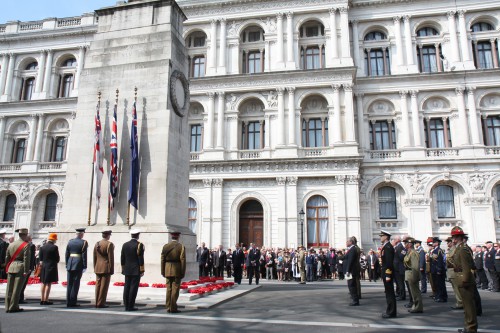22nd January 2014
War and Remembrance
This year marks the start of a whole series of commemorations to mark the 100th anniversary of the First World War. There are active current debates in both Australia and Britain around the way school curricula deal with history. But one thing is clear, we are both committed to remembering the sacrifice of the millions of men and women who died or were wounded in the terrible struggle of 1914-18.
I share a personal interest in these commemorations with many Australians: both my Grandfathers served during that war and one was wounded at the battle of the Somme. So I was concerned when, earlier this month, the Australian press carried some reports suggesting that the British government was planning to play down the role of Aussie diggers in WW1.

In fact nothing could be further from the truth. I have been closely involved in our shared plans for WW1 commemorations since I first arrived in Canberra. Only a few months ago I hosted PM Cameron’s Special Representative for WW1 Commemorations, Defence Minister Andrew Murrison, who visited Canberra to meet the Minister Assisting the Prime Minister for the Centenary of ANZAC, Australia’s Veteran’s Affairs Minister Senator Michael Ronaldson, to discuss the commemorations. My team and I have also been working with Australian officials, the ANZAC Centenary Advisory Board and the Australian National War Memorial.
But rumours based on press articles can quickly gain currency; newspaper website comments pages were buzzing as Veterans groups began to express their concerns. So it was important to clarify the position urgently. I immediately wrote a letter to the Daily Telegraph, which had first surfaced the story and this was published the following day.
It made clear that Britain fully respects the sacrifices of the ANZACs and understands the importance of the ANZAC spirit in Australian national consciousness. I pointed out that there would be commemorative events in London to mark the centenary of the Gallipoli landings in April 2015, alongside those in Turkey, Australia, New Zealand and elsewhere.
My comments were also picked up in other media, and I have been gratified to receive messages from Australian veterans in the days since its publication, welcoming our assurance that the Diggers’ sacrifices will indeed be remembered by the UK. As Foreign Secretary William Hague said when he was in Sydney last year: “Allies don’t come with broader shoulders, bigger hearts, or greater courage and resourcefulness than Australia.”